|
|
|
Sort Order |
|
|
|
Items / Page
|
|
|
|
|
|
|
| Srl | Item |
| 1 |
ID:
148781
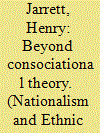

|
|
|
|
|
| Summary/Abstract |
This article analyzes the potential for consociational power sharing to pave the way for the formation of a shared identity in divided societies. It compares consociational arrangements in Northern Ireland and Brussels and argues that if this is achievable it will be demonstrated in the more liberal case of the former, rather than the corporate case of the latter. In concluding that greater intergroup engagement is occurring in Brussels than in Northern Ireland, this article challenges the ability of consociationalism to mitigate identities and looks to other factors to explain this finding.
|
|
|
|
|
|
|
|
|
|
|
|
|
|
|
|
| 2 |
ID:
169509
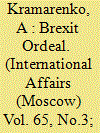

|
|
|
| 3 |
ID:
070921
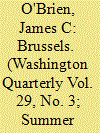

|
|
|
|
|
| Publication |
2006.
|
| Summary/Abstract |
In three or four years, European leaders will face a choice: live up to their own rhetoric in favor of enlargement to the western Balkans or bow to public expectations. Both the outcome and even the tone of the debate could have repercussions with criminal and security risks for Europe.
|
|
|
|
|
|
|
|
|
|
|
|
|
|
|
|
| 4 |
ID:
091936
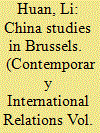

|
|
|
|
|
| Publication |
2009.
|
| Summary/Abstract |
The China studies program emerging in Brussels, the heart of European Union, is the natural outcome of China's newly established prominence on the world stage. Brussels' China studies, compared with China studies in America and European countries, is unique.
|
|
|
|
|
|
|
|
|
|
|
|
|
|
|
|
| 5 |
ID:
092151
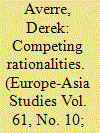

|
|
|
|
|
| Publication |
2009.
|
| Summary/Abstract |
They conclude that, with Russia having taken a different path from the liberal-democratic evolution chosen by Central and Eastern European countries, it is not clear what model of relations Moscow and Brussels should be aiming for (Karaganov & Yurgens 2008, p. 4). Their diverging positions are manifested not only in the increasing difficulties in their bilateral relationship but also in their approaches to the shared neighbourhood. In particular, the conflict between Russia and Georgia over the separatist region of South Ossetia in August 2008-and the criticism by the EU and many of its member states of Moscow's disproportionate reaction and its recognition of South Ossetian and Abkhazian independence-only indicated the shallowness of the putative 'strategic partnership'. Indeed, it led to the conclusion in Brussels that 'relations between the EU and Russia have reached a crossroads'.
|
|
|
|
|
|
|
|
|
|
|
|
|
|
|
|
| 6 |
ID:
081838
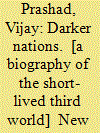

|
|
|
|
|
| Publication |
New Delhi, LeftWord Books, 2007.
|
| Description |
382p.Hbk
|
| Standard Number |
9788187496663
|
|
|
|
|
|
|
|
|
|
|
|
Copies: C:1/I:0,R:0,Q:0
Circulation
| Accession# | Call# | Current Location | Status | Policy | Location |
| 053503 | 909.09724/PRA 053503 | Main | On Shelf | General | |
|
|
|
|
| 7 |
ID:
118283
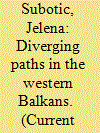

|
|
|
|
|
| Publication |
2013.
|
| Summary/Abstract |
Croatia has bought its ticket to Brussels, and Montenegro could be next, while Serbia, Bosnia, Macedonia, and Kosovo are stuck in a crowded, smoky waiting room.
|
|
|
|
|
|
|
|
|
|
|
|
|
|
|
|
| 8 |
ID:
111266
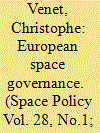

|
|
|
|
|
| Publication |
2012.
|
| Summary/Abstract |
For the third year in a row, the Paris-based French Institute of International Relations (IFRI), and the Secure World Foundation (SWF) joined together to organise their annual space conference. The event took place in Brussels on 13 September 2011, under the banner "European space governance: the outlook". This report summarises the main outputs of this event.
|
|
|
|
|
|
|
|
|
|
|
|
|
|
|
|
| 9 |
ID:
116675
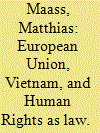

|
|
|
|
|
| Publication |
2012.
|
| Summary/Abstract |
The year 1995 marked a major watershed for modern Vietnam. It completed its post-Cold War strategy of "multilateralizing" its foreign policy by joining ASEAN, normalizing relations with the US, and signing a comprehensive framework agreement with the EU. All three are recognized as major accomplishments for modern Vietnamese diplomacy. However, in the EU-Vietnam framework agreement, Hanoi made an unprecedented concession when it agreed to the human rights clause in the treaty. For the very first time, Vietnam had accepted an explicit, legally binding stipulation on human rights in a bilateral treaty. This remarkable development resulted from the confluence of three major dynamics. First, Hanoi had committed itself to establish sound relations with all major economic centers-of-gravity at the time, ASEAN, the US, and the EU. Second, the EU also was keenly interested in stronger relations with Asian countries but was flexible about prioritizing any particular bilateral relationship. Third, Brussels' diplomats had to work off a treaty template when negotiating fundamental bilateral agreements. The standard EU framework agreement at the time included a human rights clause. In 1995, the EU was insisting that any treaty with Vietnam would have to include a clause on human rights. Initially, Hanoi rejected such a treaty provision, and the negotiations stalled. However, when Hanoi realized that Brussels felt no urgency to complete the treaty and was unable to compromise on human rights, Vietnam's leadership reconsidered. In order to complete the strategy of "multilateralizing" its international affairs, Vietnam had to accept the human rights clause in the treaty with the EU.
|
|
|
|
|
|
|
|
|
|
|
|
|
|
|
|
| 10 |
ID:
091945
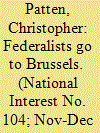

|
|
|
| 11 |
ID:
108283
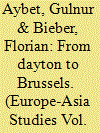

|
|
|
| 12 |
ID:
119938
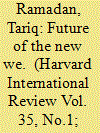

|
|
|
| 13 |
ID:
095177
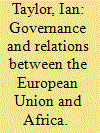

|
|
|
|
|
| Publication |
2010.
|
| Summary/Abstract |
The New Partnership for Africa's Development (NEPAD) was launched in 2001 as the pre-eminent vehicle to promote Africa's recovery. Initially it was enthusiastically promoted by a select number of countries in Africa, as well as by key members within the G-8. The European Union was active in its support, particularly vis-a-vis governance issues, stating that the EU 'finds that Africa's development efforts are best served by a greatly sharpened focus on NEPAD as the basis for partnership between Africa and the international community'. However, there have been significant problems facing NEPAD. These revolve around the actual extant political economy and dominant political cultures across Africa, which the technocratic neoliberal agenda of 'good governance' cannot deal with. Furthermore, the rise of Chinese engagement with Africa adds a major difficulty to Brussels' claim to be a key engine in supporting NEPAD's goals regarding governance and development. Indeed, the emergence of Chinese actors in Africa threatens to make much of the EU's policies on governance largely irrelevant, although it is acknowledged that, in the long term, Beijing's policy interests are not served by chaotically ruled states.
|
|
|
|
|
|
|
|
|
|
|
|
|
|
|
|
| 14 |
ID:
103412
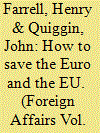

|
|
|
| 15 |
ID:
132525
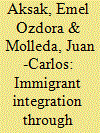

|
|
|
|
|
| Publication |
2014.
|
| Summary/Abstract |
This research focuses on the European Union's (EU) public relations and public diplomacy efforts for immigrant integration. It uncovers the relationship between the EU and leaders of Turkish associations in Brussels, Belgium. In-depth interviews with Turkish association leaders reveal the way they see themselves and the Turkish diaspora, how they reflect on their national identities, and their understanding of EU public diplomacy and public relations strategies. The communication strategies Turkish associations use to gather information about immigrant integration and their opinions on EU communication strategies are also studied. In addition, the research investigates whether two-way communication exists between the Turkish associations and the EU, and unveils the strategic communication and public relations strategies the Turkish diaspora uses to influence public policy and to engage in lobbying.
|
|
|
|
|
|
|
|
|
|
|
|
|
|
|
|
| 16 |
ID:
129891
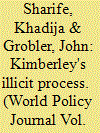

|
|
|
| 17 |
ID:
093930


|
|
|
| 18 |
ID:
132513
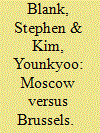

|
|
|
|
|
| Publication |
2014.
|
| Summary/Abstract |
Many see the western Balkans as the back yard of Europe. As the promise and reality of regional economic integration has weakened, however, Russia has returned to the area to play its historically important regional role. In the Balkans, a Russian or Russifying project competes against a European Union project, while Washington has shown little interest in the Balkans during the Barack Obama administration. The instruments of this rivalry are not only, or even primarily, armies but rather economic-political forces: control of energy pipelines and production, the use of that control for political objectives, and the attraction of competing political models.
|
|
|
|
|
|
|
|
|
|
|
|
|
|
|
|
| 19 |
ID:
130896


|
|
|
|
|
| Publication |
2014.
|
| Summary/Abstract |
I WOULD LIKE to point to three recent geopolitical trends which are part of European integration. The first of them is decreasing population strength, a demographic trend which betrayed itself after the 1990s in all East European, especially the Baltic, countries: all of them are steadily losing the younger population groups. Second, there are strong and strengthening interest groups oriented at certain regions: in the Baltic countries, for example, the groups oriented at Scandinavian countries oppose those looking at Brussels and Germany yet their control over corresponding countries is partial. New players on the East European scene, China in the first place, are responsible for the third trend caused by Eurasian integration. Belarus is one of the best examples: it is a member of the Customs Union with Russia and of many other integration structures inside the Union State of Russia and Belarus.
|
|
|
|
|
|
|
|
|
|
|
|
|
|
|
|
| 20 |
ID:
091762
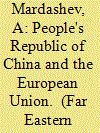

|
|
|
|
|
| Publication |
2009.
|
| Summary/Abstract |
The article examines the process of establishing a multilateral strategic partnership between the People's Republic of China and the European Union and gets to the heart of the main problems that stand in the way of Beijing and Brussels drawing closer in the future. The author concludes that resolving existing issues would be conducive to rapid completion of the negotiations on a new comprehensive agreement would, along with the creation of conditions favorable to the development of bilateral relations in the 21st century.
|
|
|
|
|
|
|
|
|
|
|
|
|
|
|
|
|
|
|
|
|